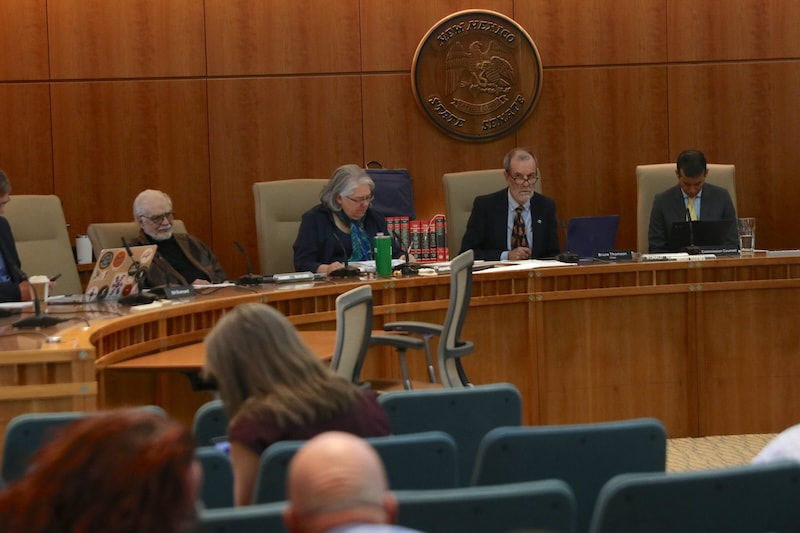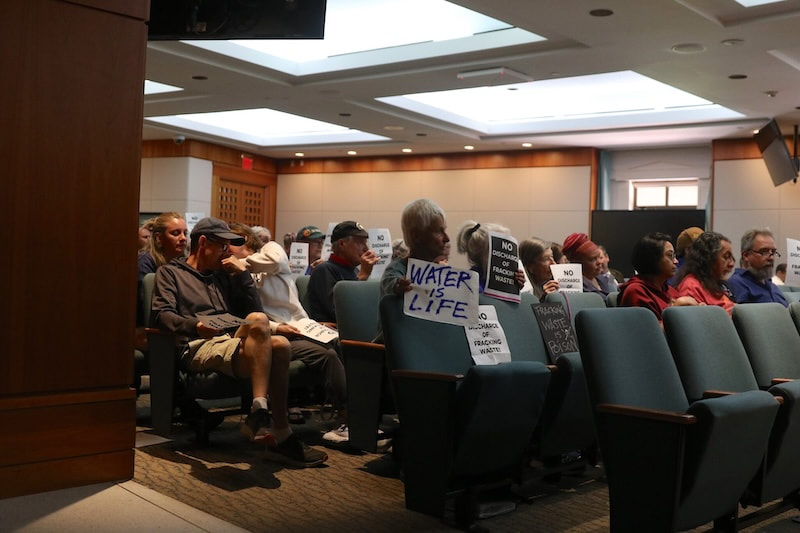|
Vote followed opposition from environmentalists, Democratic lawmakers BY: DANIELLE PROKOP - MAY 14, 2025 Courtesy of Source NM Several environmental groups declared victory in an ongoing rulemaking process to expand the uses of oil and gas wastewater beyond the oilfields, after the Water Quality Control Commission during a Tuesday hearing reversed its position to allow releases into the environment. “We’re so delighted that the commission took their responsibility so seriously and applied science and applied the law,” New Energy Economy Executive Director Mariel Nanasi told Source NM after the meeting. “There’s no evidence that produced water can be treated and reused safely; without knowing what needs to be removed from produced water, it is impossible to develop treatment standards or assure the public that discharges will be safe.” The substantial shift comes just 10 days before the WQCC has to issue a final decision in the yearslong and controversial effort to treat and potentially reuse oil and gas wastewater. The process began in December 2023 when the New Mexico Environment Department petitioned the commission to adopt rules to expand reuse beyond oilfields. That process included weeks of testimony in 2024 from scientists, water experts, environmental officials and industry representatives. Scientists project that drought and warming temperatures from human-caused climate change will reduce New Mexico’s water supplies by 25% in the next three decades, and place more strain on rivers and aquifers. For the past several years, Gov. Michelle Lujan Grisham has proposed a so-called Strategic Water Supply that would treat and use oil and gas wastewater to compensate for those losses. However, lawmakers in the most recent legislative session stripped produced water from the final bill. Opposing water and conservation groups said treatment technology for the water remains unproven and the waste poses harm to human and environmental health. The New Mexico oil and gas industry generates billions of gallons of wastewater. The mixture is extremely salty and can contain radioactive materials, heavy metals, toxic chemicals and cancer-causing compounds from the oil and gas, such as benzene. The reversal In April, the commission adopted a draft version of the rule that would allow pilot projects using oil and gas wastewater to discharge up to 84,000 gallons per day into groundwater. Environmental groups New Energy Economy, WildEarth Guardians, Amigos Bravos and the Sierra Club submitted several arguments that the decision violated existing laws; was not based on previous testimony; and potentially threatened human and ecological health. More than two dozen Democratic lawmakers also weighed in last week, urging the Water Quality Control Commission to reconsider. On Tuesday, WQCC members acceded to those arguments. “At this point, I believe it’s premature for us to authorize discharge permits, even for pilot projects,” said Commissioner Bill Brancard during deliberations. Commissioners did not allow attorneys for the environmental groups, nor ones for the oil and gas industry, to make oral arguments on Tuesday, but instead deliberated for several hours. The vote was unanimous, although two commissioners abstained, saying they had not been present for testimony in 2024, did not feel informed enough to cast a vote. About 30 people attended the Roundhouse hearing, displaying signs stating “No discharge of fracking waste” and “Water is life,” prompting warnings from two Sergeants at Arms to keep signs outside the meeting room. When commissioners voted to strike discharges from the rules, attendees applauded. “Fracking waste is by no matter a light concern,” Ennedith López, a policy campaign manager at Youth United for Climate Crisis Action (YUCCA), told Source before the vote. “It’s radioactive wastewater that they want to use potentially for agriculture projects for construction and development, and that comes at the harm of people’s health.” Commissioners also determined that state law mandates that using produced water would most likely require a permit, which would be more stringent than the process in the draft rule. At one point, commissioners floated scrapping the entire process, which would send the New Mexico Environment Department back to the drawing board, but decided instead to add language requiring pilot projects to seek permits.
Deliberations Wednesday will include more information about what information pilot projects would need to require for permitting, and if the rule needs to be revisited in the future. Attorneys for New Mexico Oil and Gas Association, which is also party to the rulemaking, declined to comment Tuesday. Produced water proponents said they were disappointed with the commission’s decision Tuesday. Restrictions on discharges will push produced water treatment to Texas, said Mike Hightower, the program director at the Produced Water Consortium, a private-public research group. ‘With no discharge, all the companies that want to discharge the water for beneficial use: agriculture, surface water, putting water in Pecos for ecological flows, can’t do that here, so they’ll go to Texas” Hightower said. He also said a permitting process would increase the time needed for approval on pilot projects. “Nobody’s going to do a small pilot project that takes a year and a half to get permitted when they can go to Texas and get it with no permit or a permit that takes a couple of weeks,” Hightower said.
1 Comment
Lauren Banner
5/16/2025 07:57:22 am
Huge win! Bravo and deep thanks for all the work to keep our waters clean. We worked on this issue in California and during that time interviewed an engineer who, after years of working for a fracking company developing the process, had reversed his position on the process and even apologized for what he had done. We learned there is no safe fracking. He explained that not only is the vast amounts of water used unable to be cleaned, the well casings will always crack at some point ( they are cement and the earth moves) releasing methane into the atmosphere. Gas companies cap the wells and plant grass atop them once used up. They are then hard to find and silently continue to release methane. They cannot be fixed ever. They are very deep and have bends in them. Not to mention the water extracted from the water table causes land to sink and can cause earthquakes to occur. Fracking is no bueno.
Reply
Your comment will be posted after it is approved.
Leave a Reply. |
Submit your ideas for local feature articles
Profiles Gardening Recipes Observations Birding Essays Hiking AuthorsYou! Archives
October 2025
Categories
All
|


 RSS Feed
RSS Feed